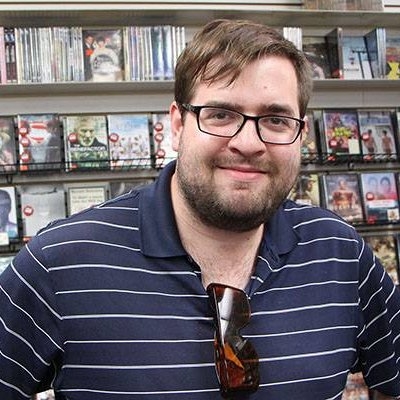
A man smiles into the camera. A shelf full of movies on DVD are behind him.
Michael McNeely has accessibility suggestions for Sundance
February 5, 2021
Dear Sundance,
It’s me, Michael. The person you let call you out last year when Crip Camp’s subtitles didn’t work. I’m happy that the subtitles did work this year—for all the films I watched. I think that’s really raising the bar for accessibility, given that some other festivals don’t even try.
There was that festival (not you!) that let us in to see a movie when it was already happening. We were the first people there, and by the time we could get into the auditorium, the movie was already playing past the main credits. The room was dark and I couldn’t see anything, so I tripped over somebody’s foot, or a chair leg. Another festival (not you!) allowed people to take photos of the pop idols in the auditorium and on screen, so I stepped on the director’s feet on my way out, nauseous and overwhelmed. I have a few stories as you can imagine.
At least with online screenings, I’m in my own living room, so I shouldn’t trip over anything except the bowl of popcorn I left on the floor because I’m lazy. That’s my issue. I’ll clean that up.
The ability to create your own accommodations is great, aside from absolving others of responsibility, of course. If you can, you can adjust lighting, sound, temperature, context and so on. These are dynamics we don’t get to adjust in cinemas without group or managerial approval. Sometimes, it can be hard to figure out what works best for you during a time-limited screening—so perhaps consider a test film that is always available for people to practice adjusting various elements.
Next, while I love, love, love having subtitles—seriously love it—I need to see them. White on white isn’t ideal, especially when I’m watching a movie about a snowstorm or a movie about a person with a messy office, with white papers scattered around. The more movies I see, the more strain I put on my eyes. Please allow for a black background or adjustable features of subtitles in the future. It will make a difference, I promise, and you will have just gone a little extra further to create mass accessibility for everyone.
Speaking of strain, the small captioning button at the bottom of the full screen view is just not cutting it for me, especially when you click on that button and need to see the very tiny words that enable captioning. It’s hard to accurately click on it, and hard to see that you’ve clicked on it.
Another thing that I’ve already mentioned is that I would love some training on how to use all the accessibility features you’ve implemented. I know that they are there, I just don’t know how to use them, so that seems like an odd misstep for an accessibility critic to be wondering about—because I’m not the only one that would struggle with this if I am already struggling.
With regards to accessibility, as mentioned in my previous blog post, financial accessibility is important too. Many people cannot afford VR to see the special exhibitions—including the powerful disability series 4 Feet High, which had some VR episodes that I sadly missed out on. Perhaps we can simulate VR on the computer screen. There are many people with disabilities that may not be able to do VR due to limitations on their movement (ironically, the main character of 4 Feet High may be one of those individuals) or as a result of their sensory needs (such as someone with anxiety issues).
I was disappointed not to be a part of the much touted spoken chatting experience that moviegoers were able to experience—as there were no options for captioning to help me interact with newcomers. I think making text-based chatrooms is best for me in future.
Attending an online festival is odd at first, but it comes with many accessibility benefits. I hope that you will not lose sight of the importance of online accessibility when you are able to return to an in-person festival. And, when you continue working on online accessibility, please remember what I have written to you in this letter.
Increases in accessibility pay off in the long run. I hope that you were able to see that by a more accessible festival in 2021.
Sincerely yours,
Michael


